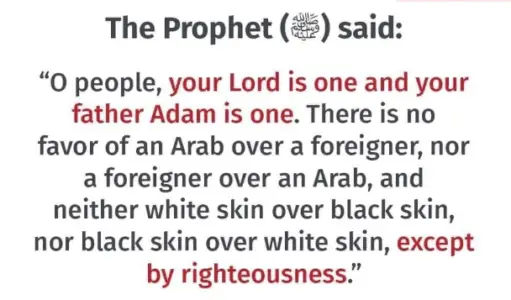Hadith on Racism: Islam’s stance against racism
Racism is a social evil that has plagued humanity throughout history, causing division, discrimination, and injustice. The world today still suffers from racism, which continues to exist on different human levels. Islam encourages believers to view one another as brothers and sisters, united by faith and righteousness, rather than dividing themselves based on superficial factors such as race or ethnicity. Islam stands firm in its opposition to racism, promoting equality, justice, and brotherhood among all individuals.
Rooted in the teachings of the Quran and the Hadith (sayings and actions of the Prophet Muhammad, peace be upon him), Islam provides a powerful foundation for combating racism and fostering a harmonious society. This article delves into the context of Islamic teachings to highlight how Islam fundamentally rejects racism.

Islam’s stance against racism –The Unity of Mankind in the Quran:
The Quran, the holy book of Islam, emphasizes the fundamental equality and unity of all human beings. It categorically states that all humans descend from a common ancestor, Adam and Eve, thereby dismissing any notion of racial superiority or inferiority.
In Surah Al-Hujurat (49:13), the Quran proclaims, “O mankind, indeed We have created you from male and female and made you peoples and tribes that you may know one another. Indeed, the most noble of you in the sight of Allah is the most righteous of you.”Allah also says in the Quran: {O mankind! Be careful of your duty to your Lord Who created you from a single soul and from it created its mate and from them twain hath spread abroad a multitude of men and women.} (An-Nisa 4:1)
These verses highlights that the worth of an individual lies in their piety and righteousness, not in their ethnicity, race, or nationality. It stresses the importance of recognizing and celebrating diversity as a means of fostering mutual understanding and appreciation.
This verse posed a direct challenge to the prevailing norms of pre-Islamic Arabian culture, which entrenched inequalities rooted in tribal affiliations, kinship, and economic disparities. An individual’s social standing was predominantly determined by their lineage or “nasab” in Arabic. Social status was heavily influenced by belonging to influential tribes.
Islam’s stance against racism -Hadith on Racism

Islam fosters a sense of brotherhood and sisterhood among its followers, transcending racial, ethnic, and cultural boundaries. The Prophet Muhammad (pbuh) is reported to have said, “A Muslim is a brother of another Muslim, so he should not oppress him, nor should he hand him over to an oppressor. Whoever fulfilled the needs of his brother, Allah will fulfill his needs” (Sahih Muslim).
This profound Hadith encapsulates the essence of Islamic teachings regarding the treatment of fellow human beings. It encourages Muslims to support and uplift one another, irrespective of their racial or ethnic backgrounds, and prohibits any form of oppression or discrimination.
Here are some more Hadith against Racism
- Narrated by Abu Dawood, the Prophet Muhammad (pbuh) said: “Whoever has an atom’s weight of arrogance in his heart will not enter Paradise. And whoever has an atom’s weight of faith in his heart will not enter the Fire.”(Tirmidhi)
- The Prophet Muhammad (pbuh) said: “Indeed, Allah does not look at your outward appearance or wealth. But He looks at your hearts and actions.” (Sahih Muslim)
- The Prophet Muhammad (pbuh) said: “A person who calls others to follow the right guidance will receive a reward equal to the reward of those who follow him, without their rewards being diminished in any respect. And whoever invites others to follow an error, he will receive a burden of sin equal to the burdens of those who follow him, without their burdens being diminished in any respect.” (Sahih Muslim)
- The Prophet Muhammad (pbuh) said: “You should listen to and obey your ruler even if he was an Ethiopian (black) slave whose head looks like a raisin.” (Sunan Ibn Majah)
These Hadith emphasizes the equal rights and responsibilities of all individuals, regardless of their racial background. It dismisses any notion of racial discrimination and emphasizes the importance of obeying just leadership.
Other proofs against racism in Islam
The Final Sermon of the Prophet Muhammad (pbuh) against racism:
An arab has no superiority over a non-arab hadith
One of the most significant events in Islamic history is the Farewell Sermon delivered by the Prophet Muhammad (pbuh) during his final pilgrimage. In this sermon, the Prophet addressed a multitude of Muslims from diverse backgrounds, emphasizing the unity and equality of all believers. He explicitly stated, “All mankind is from Adam and Eve. An Arab has no superiority over a non-Arab, nor does a non-Arab have any superiority over an Arab; a white has no superiority over a black, nor does a black have any superiority over a white, except by piety and good action.”
These words serve as a timeless reminder of the Islamic stance against racial discrimination and the importance of judging individuals based on their character and deeds, rather than their racial or ethnic backgrounds.
Historical Examples of Islamic Anti-Racism:
Throughout Islamic history, numerous examples highlight Islam’s commitment to combating racism.

The appointment of Bilal ibn Rabah, an Abyssinian slave, as the first muezzin (caller to prayer) in the early Islamic state, showcases the Prophet’s (pbuh) rejection of racial prejudice. Similarly, the story of the renowned companion, Salman the Persian, demonstrates the value Islam places on individual character over ethnicity.
The Equality in Hajj: During the Farewell Pilgrimage, the Prophet Muhammad (pbuh) delivered a sermon in which he proclaimed that no Arab had any superiority over a non-Arab, and no non-Arab had any superiority over an Arab. This declaration, made to a diverse gathering of Muslims during the Hajj pilgrimage, highlighted the equality and unity of believers from all racial and ethnic backgrounds. It emphasized that the measure of one’s worth in Islam is based on righteousness and piety, not on race or nationality.
The Legacy of Al-Andalus: During the Islamic rule in Spain (Al-Andalus) from the 8th to the 15th century, Muslims, Christians, and Jews lived together in relative harmony. Islamic civilization in Al-Andalus thrived on a culture of tolerance, intellectual exchange, and cooperation among people of different races, ethnicities, and religions. Scholars, scientists, and artists from diverse backgrounds made significant contributions to various fields, transcending racial and religious boundaries.
conclusion:
We should not discriminate amongst the people on the basis of their race or skin colour, Who knows they may be closer to Allah on the basis of their Taqwa.
Discover more from Islam Hashtag
Subscribe to get the latest posts sent to your email.




